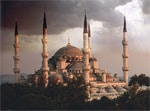Its EU hopes may be faltering, but Turkey is relentlessly pursuing its ambitious reform programand reaping significant benefits in the process.

While at least a decade away from possible membership in the European Union, Turkey is luring record levels of direct investment as its state entities and private banks prove a magnet for domestic and foreign buyers.
Over the past year the government of this mainly Muslim nation has generated more than $10 billion as it sold off stakes in oil refiner Tupras Refinery, two giant telecommunications firms Telsim Mobile and Turk Telekom and steel giant Erdemir Steel. Its banking sector is enticing European financial institutions such as the National Bank of Greece, which in April announced a deal to lay out $5.6 billion for 46% of Finansbank, while Franco-Belgian Bank Dexia announced its 75% purchase of DenizBank, among Turkeys top-10 private banks, for $2.4 billion barely a month ago.
Foreign direct investment (FDI) could tally $17 billion in 2006, with about 70% of the inflow coming from companies based in the EU, says Tolga Egemen, executive vice president of GarantiBank in Istanbul. State-owned entities up for sale this year include Turkish electricity distribution companies, the cigarette division of tobacco and alcoholic drinks producer Tekel, and financial players VakifBank and Halkbank.
That would be a jump from FDI totals of nearly $9 billion for 2005, of which 40% emanated from EU-based firms, says Egemen, adding that the EU integration process is an important factor behind Turkeys macroeconomic stability. Even though the process has slowed down since the beginning of 2006, no government, the current or the next, can afford to significantly slow down or completely stop the EU accession process, he says.
Analysts say it is the combination of Turkeys likely entry into the EU and a market of 70 million people strategically situated at the crossroads of the West and the East that makes the country a magnet for investment. There is the expectation that no matter how long EU accession takes, the market is growing and the per capita level will also grow, says Kaan Nazli, an analyst with Eurasia Group, a political risk firm based in New York City. Theres an emerging middle class and a migration to urban areas that is demanding products.
According to EU estimates, Turkeys nominal gross domestic product per capita will be $5,692 for 2006, compared with $29,763 for the European Union and $8,410 for Poland, which entered the EU two years ago, Nazli says. That puts it ahead of other EU candidate countries, such as Romania and Bulgaria, which have GDP per capita figures of $5,254 and $3,686 respectively and are slated to join the EU by 2008.
Government Committed to EU
Analysts say the government of Turkish prime minister Recep Tayyip Erdogan is dedicated to making the reforms necessary to gain membership in the EU, now a coveted group of 25 nations that spreads from Spain in the southwest to Lithuania on the shores of the Baltic Sea. Saruhan Ozel, an executive with DenizBank in Istanbul, says:The government and all other political parties support EU accession. During the constitutional voting or any problematic phases between Turkey and EU, it was announced several times by the government that, with or without the EU, Turkey will continue to make all necessary political, social and economic reforms.
Yet Charles Kupchan, a senior fellow and director of European studies at the Washington, DC, office of the Council on Foreign Relations, remains pessimistic about the current accession talks that opened in October 2005. I think both sides realize that it is just a shell game. In the past year the political environment in Europe has darkened and is skeptical of enlargement in general, especially with regard to Turkey, he says.
Kupchan points to Dutch and French voters rejection of the European Constitution in the spring of 2005 as evidence of Europeans exasperation with the continents rapid enlargement over the past decade as well as the swelling tide of migrants into Western Europe. And Turkeys debate over the role of religion in public life, evidenced by mass demonstrations in May that supported secularism after a gunman shot and killed a top judge who had upheld a ban on women wearing Muslim headscarves in public buildings, also does not bode well for European integration. It would be difficult to integrate a Muslim nation of 70 million people, says Kupchan, adding that European attitudes have also sparked a shift in mindset among many Turks. Theres a certain questioning now among Turks. Do we want to be a part of [Europe]?
Despite the recent political furor over religious issues and the rockier road to EU integration, the Turkish economy remains upbeat. The currency crisis of the spring has largely faded, and the International Monetary Funds executive board is expected to consider wrapping up the third and fourth reviews of Turkeys IMF stand-by arrangement this month.This would let Turkey draw down a new loan tranche of nearly $1.9 billion, according to the IMF after a group of its staff concluded a recent mission to Ankara.
Mixed Economic Results
Analysts are predicting that this giant nation stretching from Bulgaria in southeastern Europe to Georgia in southwestern Asia will post GDP growth of 5% to 6% this year and slightly less growth of 4% to 5% in 2007. Inflation, meanwhile, should settle at about 10% this year and 8% in 2007, down significantly from the 73% rate at the start of 2002 but still higher than targets set by the central bank. Analysts credit the floating exchange rate regime, an independent central bank, the IMF-backed stability program and the governments reform program as factors backing the decline in inflation since the financial crisis of 2001.
The Turkish central bank had set inflation targets of 5% and 4% for 2006 and 2007 respectively, but high global commodities prices, increasing consumer demand and exchange rate volatility have put pressure on the central banks targets, says Egemen of GarantiBank. Even though mid-term projections still point to falling inflation levels in 2007, the outlook for the rest of the year makes the 2006 target hard to achieve, he adds.
Analysts agree that government reform efforts, which encompass everything from the social security system and tax administration to budget discipline that reins in public spending, are essential to keep the economy stable and expanding. The Turkish economy is more predictable and stable compared to the 1990s, with low inflation and a low interest rate environment, says Hayri Culhaci, executive vice president of strategy at Akbank in Istanbul.Budget discipline is established, and public sector borrowing requirements are being brought to manageable levels.
The controversial legislation overhauling the countrys social security system was rejected by the president but is now being returned to parliament for an expected second stamp of approval. The legislation would help lower the governments debt burden by strengthening the programs administration and gradually increasing the retirement age to 65 years old for both sexes by 2048. The retirement age is now 58 for females and 60 for males.
The International Finance Corporation, the private sector arm of the World Bank, has recognized the upturn in Turkey, where it has operated for more than 40 years. As of April 2006 the IFC has more than $2.7 billion of cumulative investment in Turkey, making it the third-largest country in the agencys portfolio, says George Konda, senior economist for southern Europe and central Asia at the Washington, DC, headquarters of the IFC. The agency typically provides long-term financing for private sector borrowers through both financial crises and solid economic times.
 |
|
|
Turkey is a big market in itself, but it also serves as an export platform to Europe, says Konda. Theres a misperception that it exports small, cheap products. But it is increasingly exporting items like auto parts and cars to Europe. Other export-oriented sectors that are profitable are electronics and white goods, large appliances like refrigerators, washing machines and dishwashers, says one Istanbul-based banking official.
Banks Tempt Buyers
It is the Turkish banking sector that is generating the most attentionand dollarsfrom European investors. Faced with limited opportunities in their own slow-growth economies, executives at European financial institutions have been eyeing the Turkish banking sector since Unicredito of Italy acquired 50% of Koc Bank 2002. The trend took off in late 2004 when French bank BNP Paribas bought a 50% stake in TEB Mali Yatirimlar, the majority shareholder of Turkish bank Trk Ekonomi Bankasi from the Turkish conglomerate Colakoglu Group.
A slew of 2005 purchases included the Belgian-Dutch Fortis Groups acquisition of nearly 90% of Disbank from Dogan Holding, a Turkish conglomerate, and the purchase of nearly 58% of Yapi ve Kredi Bankasi by the Koc-UniCredit partnership.
Foreign banks have been attracted by a leaner and stronger Turkish banking system honed by tougher banking regulations that helped cut the number of banks to less than 50, down from nearly 80, over the past several years. Tougher supervision by the independent Banking Regulation and Supervision Agency as well as banking regulations that have moved the Turkish banking system to greater harmonization with international and European banking practices have also helped.
The only problem facing foreign purchasers right now, says Fitch Ratings senior director Ed Thompson, is that most of the attractive mid-size prospects are long gone. The smaller banks dont have the franchise that foreign owners want, he says, adding that Turkish banks with strong retailing franchises that can meet consumers emerging appetites for mortgages, credit cards and loans are most attractive.
Thompson says corporate lending is not a growth market in a country where most domestic corporations have adequate amounts of cash on hand or can turn to the international debt markets for financing.
Candidates for purchase include private bank Sekerbank, which was to be purchased by Dutch Bank Rabobank in a deal that fell apart last year. The government also is expected to sell off VakifBank and Halkbank, two state banks, this year. Thompson says the sheer size of many state-owned banks, with an unwieldy expanse of branches and inefficient administration, makes them less likely candidates for sale.
Paula L. Green



